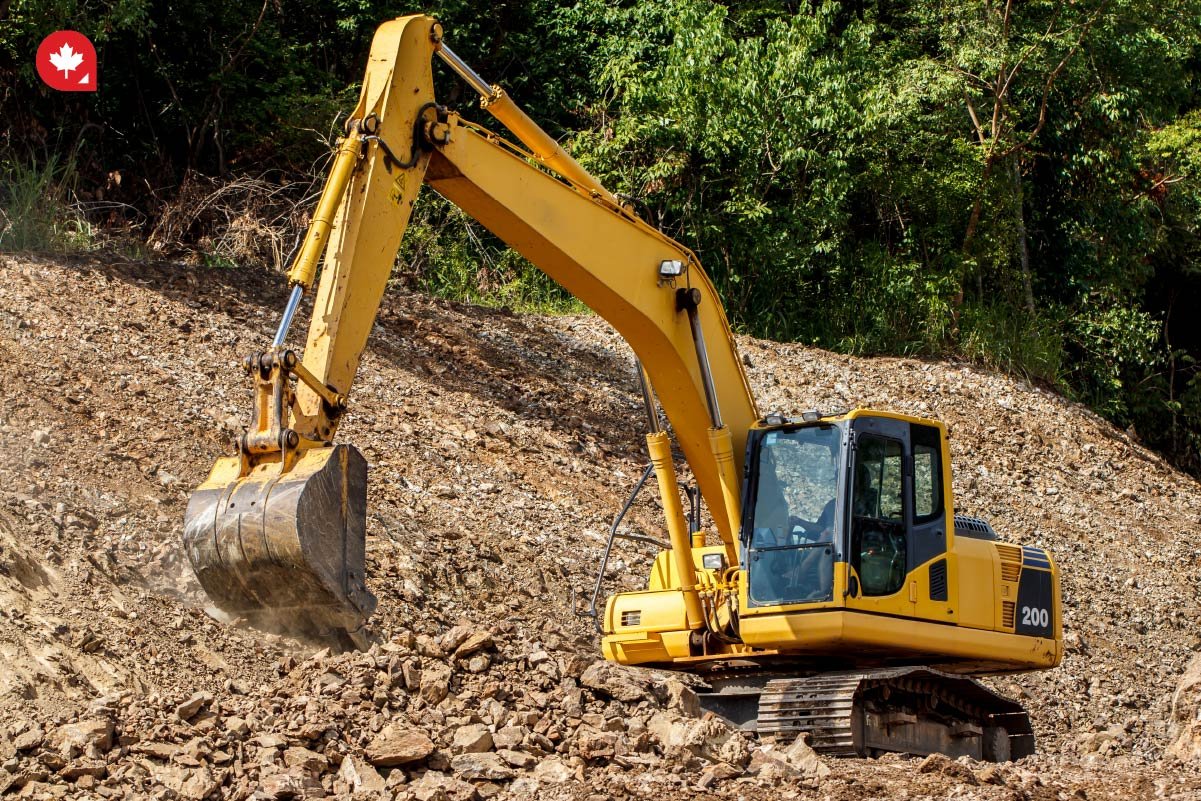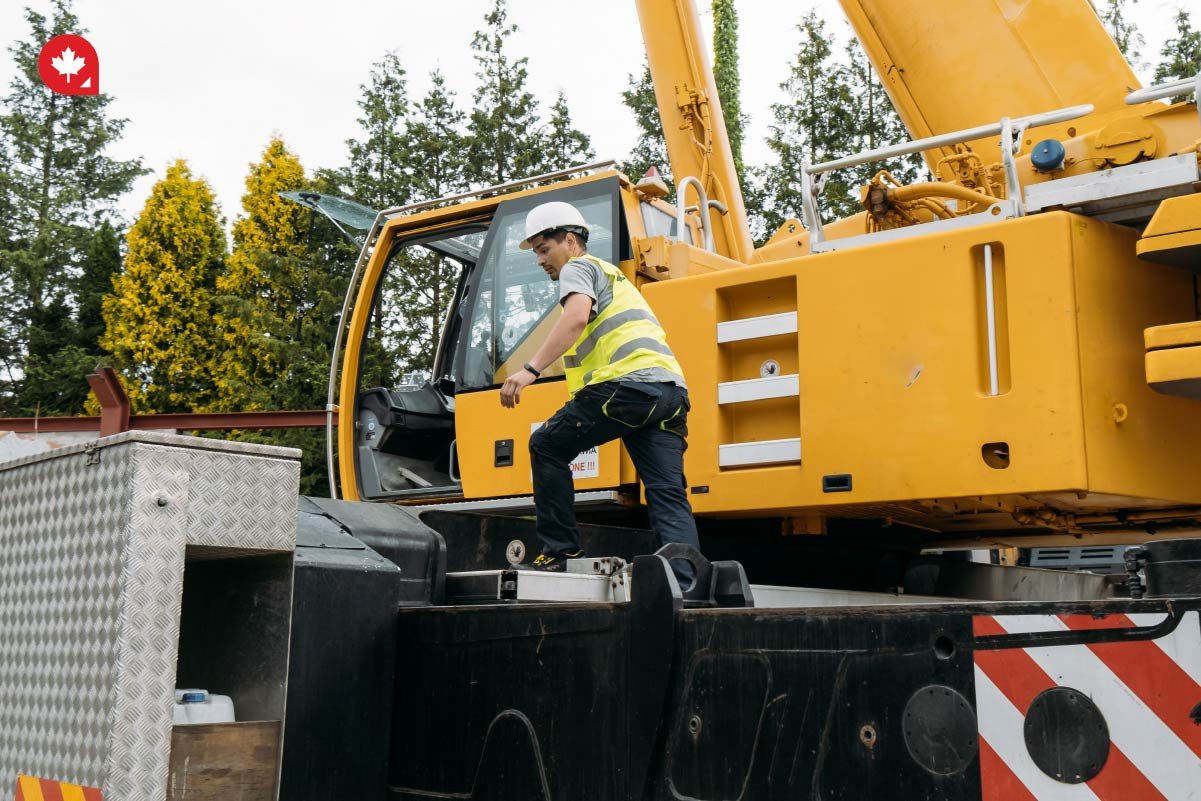Canada is ideal for foreign heavy equipment operators looking to immigrate and work abroad. The country's booming construction industry offers numerous heavy equipment operator jobs in Canada for skilled foreign workers.
Many skilled foreign workers struggle to know how to become heavy equipment operators in Canada. Hence the Canadian government has established different immigration programs to facilitate foreign skilled workers' immigration to Canada.
From the Canada work permit to the Express Entry Canada system, there are plenty of immigration visa pathways skilled immigrant workers can use to move to Canada. Heavy machine operators can expect a generous heavy equipment operator salary in Canada and a high demand for heavy equipment operators in Canada. This is one of the most favorable job prospects in Canada among its numerous occupations.
Want to know more about how to make your mark in Canada as a Heavy Equipment Operator? Here is all you need to know about how to become a heavy equipment operator in Canada!
How to Immigrate to Canada as a Heavy Equipment Operator

The process of immigrating to Canada as a Heavy Equipment Operator can be accomplished by applying to any of the following immigration visa pathways.
Express Entry
Express Entry is an online system that Immigration, Refugees and Citizenship Canada (IRCC) uses to manage permanent residence applications for skilled workers. The system has three programs:
- Federal Skilled Worker Program
- Federal Skilled Trades Program
- Canadian Experience Class
To be eligible for Express Entry, candidates must meet certain requirements regarding:
- Language proficiency
- Education
- Age
- Clear criminal record
- Medical history
- Work experience
As a heavy equipment operator, you may be eligible for the Federal Skilled Trades Program, designed for skilled workers in specific trades.
Federal Skilled Trades Program
The Federal Skilled Trades Program (FSTP) is one of the immigration programs under the Express Entry system. This program is designed to attract skilled workers in specific trades to Canada. The base eligibility requirements:
- Have at least two years of full-time work experience in a skilled trade
- Meet the job requirements for the skilled trade, as set out in the National Occupational Classification (NOC) and Training, Education, Experience, and Responsibilities (TEER) categorization systems.
- Meet the Canadian Language Benchmark (CLB) requirements for FSTP (level 4 for reading and writing and level 5 for listening and speaking)
As a heavy equipment operator, your occupation falls under the NOC code 73400 and TEER 2 category. The job requirements include operating heavy equipment to excavate, move, and load materials. If you have prior experience performing these duties in Canada, you’re eligible to apply for the Canadian Experience Class (CEC).
Canadian Experience Class
The Canadian Experience Class (CEC) is another immigration program under the Express Entry system. This program is designed for foreign workers with at least one year of work experience in Canada. The base minimum eligibility requirements for this program include:
- Have at least one year of full-time work experience in Canada, in a skilled occupation
- Meet the CLB requirements for your occupation ( CLB 5/7 in English or French)
- Be admissible to Canada
This program can be a faster route to permanent residence for those who already have Canadian work experience.
Provincial Nominee Programs
Provincial Nominee Programs (PNPs) are immigration programs designed to meet each province or territory's specific labor market needs. Each province or territory has its own PNP, with different requirements and categories.
Some PNPs have specific categories for skilled workers, including heavy equipment operators. Some of the PNP streams and pathways that immigrants can use to apply are outlined in the table below:
To be eligible for a PNP, you must meet the specific program and category requirements. Each PNP has its application process and processing times. Some PNPs may require a job offer or a certain level of language proficiency, among other requirements.
Pilot Programs for Heavy Equipment Operators
The Canadian government has established pilot programs to facilitate the immigration of skilled workers in specific occupations. One of these programs is the Atlantic Immigration Pilot Program.
Atlantic Immigration Pilot
The Atlantic Immigration Pilot (AIP) is designed to attract skilled workers to the Atlantic provinces of Canada, including:
As a heavy equipment operator, you may be eligible for this program if you have a valid job offer from an employer in one of these provinces. The most suitable AIP immigration stream that skilled foreign heavy equipment operators can use to apply is the Atlantic Intermediate-Skilled Program.
Atlantic Intermediate-Skilled Program
The Atlantic Intermediate-Skilled Program is designed for workers in specific occupations, including heavy equipment operators. This program allows eligible foreign skilled workers with an employment offer from an Atlantic Canada employer to apply for permanent residence in Canada.
Rural and Northern Immigration Pilot
The Rural and Northern Immigration Pilot (RNIP) helps employers operating in participating communities to fill job posts not filled by the domestic labor market. The RNIP provides a permanent residence (PR) path for skilled foreign workers who intend to live and work in one of the participating communities.
Construction is one of the most prominent and in-demand industries in Canada’s rural and RNIP-participating communities. Heavy equipment operators are valued workers within Canada’s construction industry. Therefore the use of the RNIP presents the perfect opportunity for skilled heavy equipment operators to immigrate to one of Canada’s rural communities and contribute to its construction boom.
Work Permits for Heavy Equipment Operators
If you are not eligible for permanent residence, you may still be able to work in Canada as a heavy equipment operator with a work permit. To obtain a work permit, you must first have a job offer from a Canadian employer. The employer must apply for a Labor Market Impact Assessment (LMIA) from Employment and Social Development Canada (ESDC) to prove that no Canadians or permanent residents can fill the position.
Once the employer has an approved LMIA, they can provide you with a job offer, which you can use to apply for a work permit. The work permit will be valid for the duration of your job offer, and you may be able to renew it if you have a new job offer. There are primarily two types of work permits in Canada; open and employer-specific work permits.
- Employer-specific work permit
- Grants the prospective immigrant holder to work for a sole Canadian employer for a certain period at a single location.
- Open work permit
- Enables the recipient the right to work for any employer in Canada for a specific period.
The work permits most suitable for Heavy Equipment Operators to use include:
- Temporary Foreign Worker Program (TFWP)
- Bridging Open Work Permit (BOWP)
Learn more about how to apply for a Canada work visa.
Canadian Provinces Where Heavy Equipment Operators Are Most In-demand

Heavy equipment operators are in-demand in many provinces and territories in Canada due to the country's growing construction industry. According to the Government of Canada's Job Bank, the following provinces have the highest demand for heavy equipment operators:
Nova Scotia
Nova Scotia is a province located in eastern Canada, with approximately 970,000 people. The province has a growing construction industry, with many infrastructure projects in progress. Heavy equipment operators are in high demand in Nova Scotia, particularly in the Halifax Regional Municipality.
Halifax, the most populated city in the province and one of the most populated in Atlantic Canada is the bustling commercial and financial center in eastern Canada that offers many opportunities for new immigrants.
Prince Edward Island
Prince Edward Island is a small province located off the east coast of Canada, with a population of approximately 160,000 people. The province has a growing construction industry, with many infrastructure projects in progress.
Heavy equipment operators are in high demand in Prince Edward Island, particularly in the provincial capital city of Charlottetown, which continues to expand due to demand for institutional office space for industry and government administration.
Saskatchewan
Saskatchewan is a province in western Canada with approximately 1.2 million people. The province has a strong resource-based economy, with many ongoing mining and construction projects. Heavy equipment operators are in high demand in Saskatchewan, particularly in the mining and oil and gas industries.
Saskatoon, the province's largest and most populated city, is one of the main trade hubs for the Canadian prairies’ resource-based economy. It presents many opportunities for skilled immigrants who want to capitalize on Canada’s booming primary industries.
Yukon Territory
The Yukon Territory in northern Canada, hosts a population of approximately 40,000 people. The territory has a growing mining industry, with many ongoing exploration and development projects. Heavy equipment operators are in high demand in the Yukon Territory, particularly in the mining industry.
Whitehorse, the largest and most populated city in Northern Canada, is the region's primary center for trade and commerce. Called the wilderness city, the crossroads between the Canadian wintry wilderness and inhabited Canada.
Find out more about the Canadian mining industry.
The Benefits of Being a Heavy Equipment Operator in Canada?

Working as a heavy equipment operator in Canada can offer many benefits, including:
Employment Opportunities for Heavy Equipment Operators
Canada's construction industry is booming, and heavy equipment operators are in high demand nationwide. This means many job opportunities exist for skilled workers, including those looking to immigrate to Canada.
Skills Development Opportunities
Working as a heavy equipment operator in Canada can offer opportunities for skills development and career path advancement. Many employers offer training programs and opportunities for on-the-job learning, which can help workers improve their skills and advance their careers.
Employment Benefits
In Canada, workers are entitled to certain employment benefits, such as paid vacation time, sick leave, and health insurance. These benefits can help workers maintain their health and well-being and provide financial security.
Provides a Path to Permanent Residence
Working as a heavy equipment operator in Canada can offer a path to permanent residence, providing long-term stability and security for workers and their families. With the right qualifications and skills, workers may be able to apply for permanent residence through one of the immigration programs mentioned above.
High Wage/Salary
Heavy equipment operators in Canada can earn a high wage or salary, depending on their experience and qualifications. According to Canada's Job Bank, the median annual wage for heavy equipment operators in Canada is 58,500 CAD.
Immigrating to Canada as a heavy equipment operator can offer many opportunities for skilled workers. With different immigration programs, including Express Entry, PNPs, and work permits, heavy equipment operators can find a path to permanent residence or temporary work in Canada.
The country's booming construction industry and high demand for skilled workers make it an ideal destination for those looking to advance their careers and provide long-term stability for themselves and their families.
FAQs
Are There Any Restrictions for Heavy Equipment Operators Immigrating to Canada?
There are certain restrictions for heavy equipment operators looking to immigrate to Canada. To be eligible for immigration programs, you must meet certain requirements regarding:
- Language proficiency
- Education
- Work experience
You must also meet the job requirements for your specific occupation, as set out in the NOC.
What Are the Qualifications Needed to Work as a Heavy Equipment Operator in Canada?
To work as a heavy equipment operator in Canada, you must have the necessary skills and qualifications for the job. This may include a high school diploma or equivalent and training in heavy equipment operation. Some employers may also require a valid driver's license and a clean driving record.




